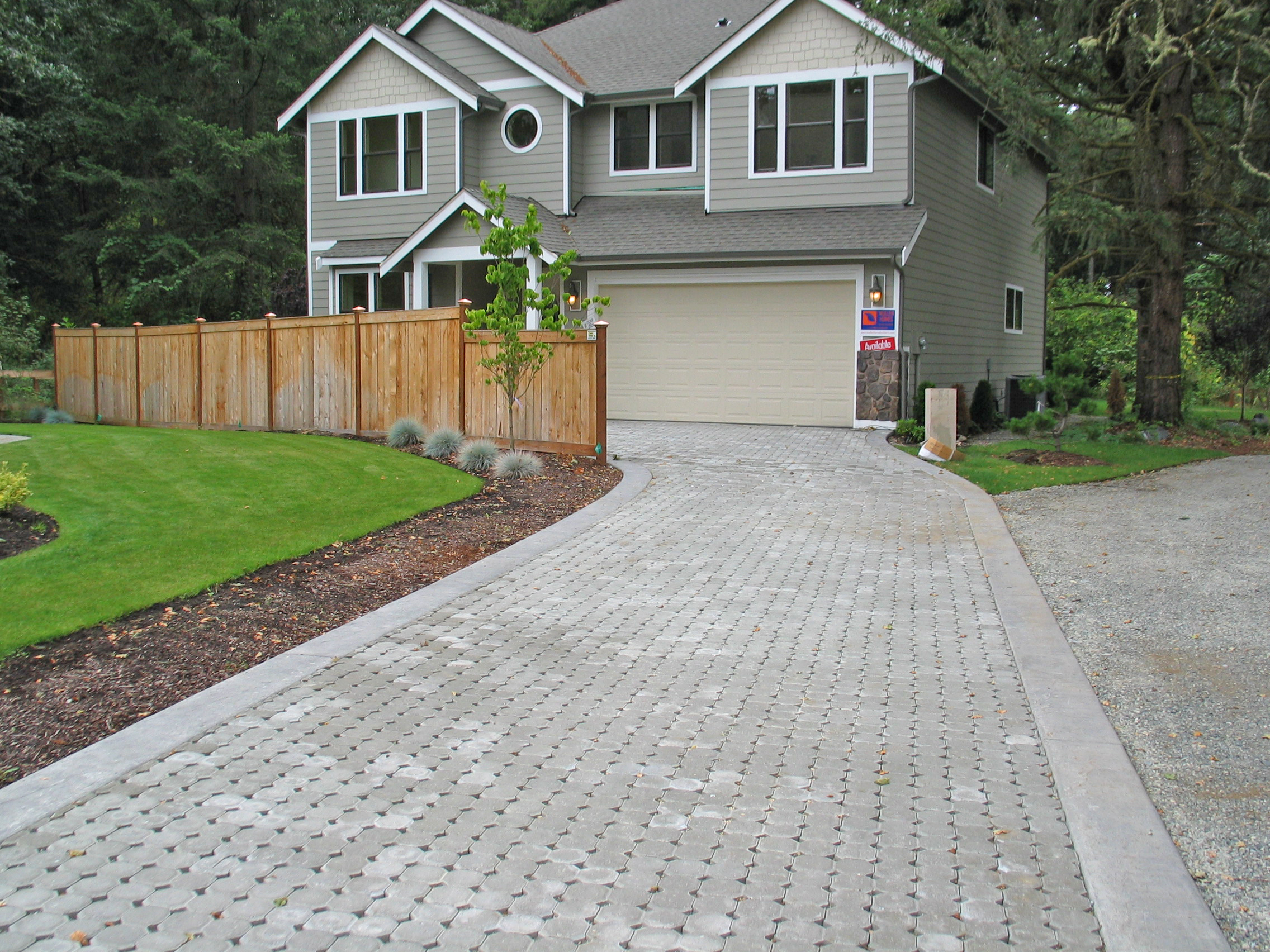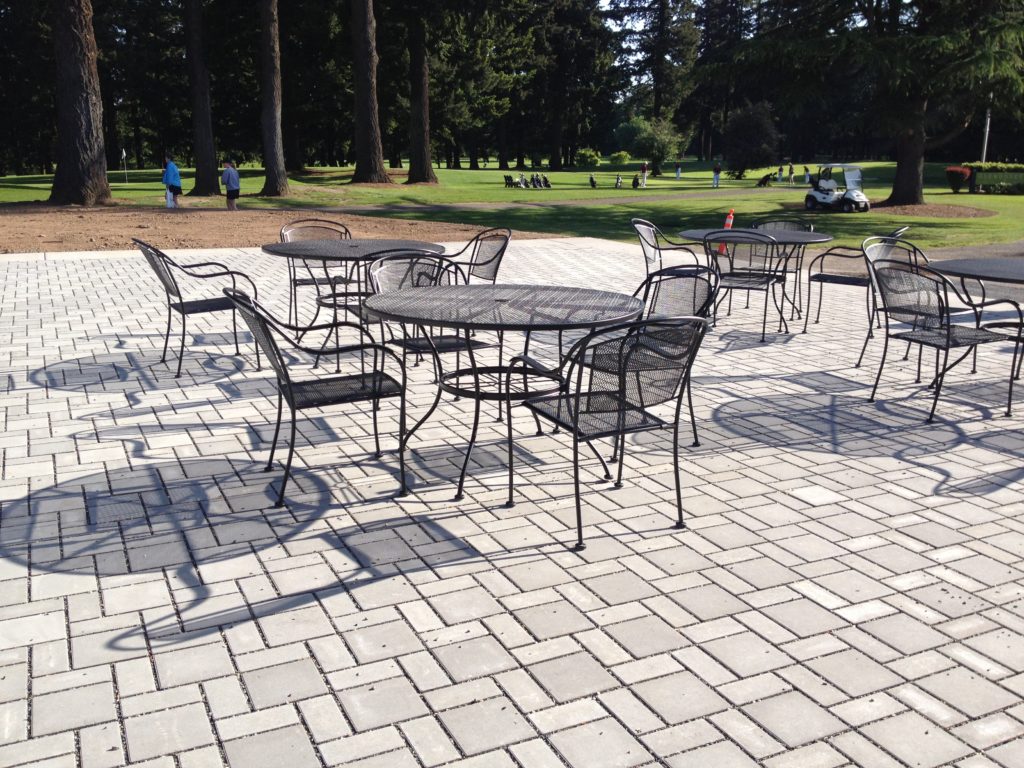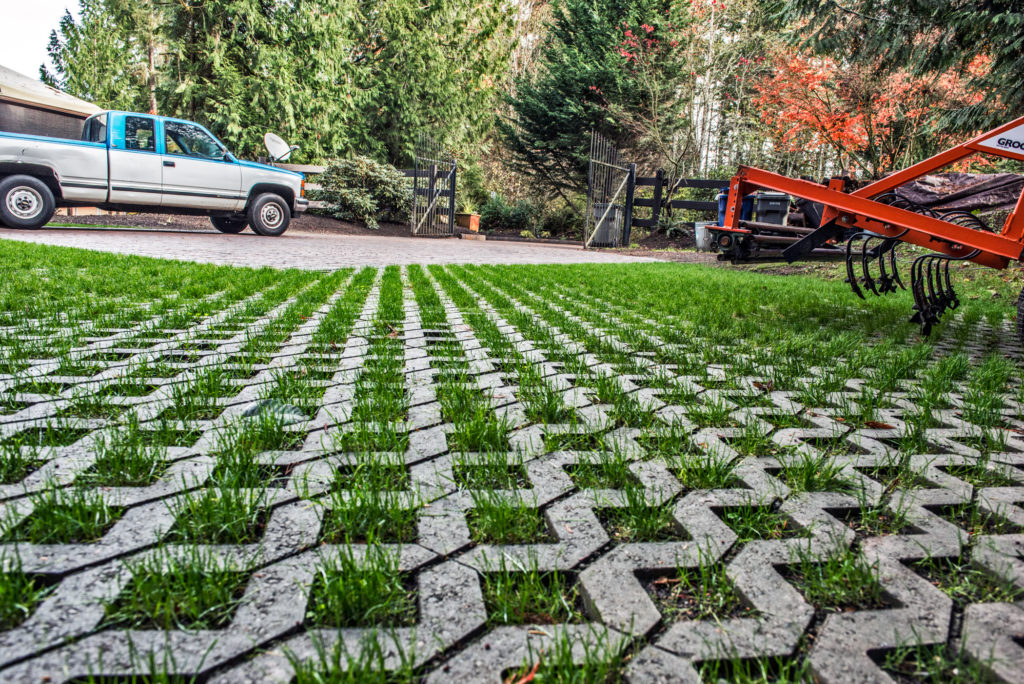Interlocking concrete pavers add beauty and distinction to your home or yard, whether it’s a driveway, patio, or walkway. Often permeable concrete pavers are the optimal choice for living a more environmentally-friendly lifestyle due to over-saturation of soil, municipal codes, or project owner’s desire. If you live somewhere with high rain frequency and are remodeling, you may be required to have a solution to reducing stormwater runoff. Check our blog on Seattle’s stormwater mitigation requirements. Before you make the decision to use permeable interlocking concrete pavers, you should consider the function/benefits, price, where to buy them, and whether or not you want to install them.
 What Are Permeable Pavers?
What Are Permeable Pavers?
Permeable pavers, porous pavers, and pervious pavement all work to limit runoff, reduce downstream erosion, and improve water quality through the filtering of pollutants in their sub-layers; the main difference between the three is how they do it. Permeable pavers work by guiding water through large gaps (voids) in the joints between the pavers, while porous pavers and pervious pavement work by absorbing water directly through the paver itself. The voids in permeable pavers, even though they are filled with a clean aggregate, can become plugged with random debris and sediment so they do require some occasional maintenance to clean out any clogged voids. People often choose permeable pavers because of their architectural aesthetic combined with their ability to handle heavy vehicular loads and pedestrian traffic.
Porous pavers are generally a grid system where the voids are filled with sand, gravel, or dirt and perform as well as permeable pavers in soil retention and water filtration. They are typically made with concrete but can be manufactured out of plastic. Since they are more of an open-cell paver, they typically aren’t used as much in industrial settings, like ports and manufacturing facilities, instead they are usually used for parking strips and driveways.
Pervious pavement differs in permeability by filtering water directly through the unit itself, allowing the ground underneath to breathe and encouraging the growth of neighboring tree roots, thus supporting the interaction of microbes that fight pollutants. Pervious pavement is typically less durable than permeable pavers and not intended for use in areas where there is heavy vehicular traffic.
How Does A Permeable Interlocking Concrete Pavement System Work?
A PICP system works by allowing rainwater to infiltrate directly back into the soil before it can be carried into storm drains while preventing flooding and maintaining structural integrity suitable for vehicular and pedestrian traffic. There are a lot of components involved in creating an entire permeable concrete paver system that differentiates them from a traditional concrete paver project. Unlike a standard concrete paver project that is installed over a base of compacted 5/8” minus gravel and bedding sand, permeable pavers require the installation of a more comprehensive system. Once the area is excavated, an installer will lay down a geotextile, which serves as a filter for heavy metals and other pollutants. On top of this will be an open graded sub-base of ¾” – 2” gravel (no fines), which serves as a reservoir for stormwater runoff, topped by another open-graded base of ¾” aggregates (no fines), a bedding course of ¼” gravel (no fines), and finally the permeable pavers. These permeable pavers have larger gaps (voids) between joints compared to standard interlocking concrete pavers that allow stormwater to percolate directly back into the base. Check out the video to see how a permeable paver system works.
How Much Do Permeable Pavers Cost?
There are a lot of factors that come into play when installing any type of concrete paver. The project’s location, the soil quality, accessibility, and timeline all come into consideration when a project is priced out. Permeable pavers are roughly the same price as any other concrete paver, however, because of the work involved in adding drainage and washed aggregates, installation costs can run higher. Generally, homeowners can expect pay between $22 to $26 per square foot to have a permeable paver system installed by a contractor. In comparison, a standard interlocking concrete paver project will run a homeowner between $18 and $22 per square foot when professionally installed.
Where Can I Buy Permeable Pavers?
Mutual Materials is the leading manufacturer and retailer of permeable pavers in the Pacific Northwest. With 16 branches throughout Washington, Oregon, Idaho, and Montana, our permeable pavers are available to you. We have a variety of permeable pavers that cater to both residential and commercial applications. Once you have decided you want to move forward with your permeable paver project, you have a variety of looks you can chose from. Our most popular product for homeowners and builders is Eco-Priora because it comes in two sizes: 4” x 8” and 8” x 8” units.

If you are interested in a turf grid paver instead of permeable pavers, you can go with TurfStone. This is a popular option for homeowners looking to control erosion or create a simple parking strip for their landscape. This open cell grid paver provides structural integrity while allowing grass to grow through the grid giving your project the green look of grass.

Both of these permeable paver lines will work in commercial applications as well. However, in commercial projects like parking lots, manufacturing plants, streets, military installations, and industrial parks where the area can be significantly larger, project owners typically opt for EcoLoc, Eco-Stone, or our Permeable Holland Herringbone 8 cm, which can be installed mechanically. The Permeable Holland Herringbone installation technique involves the use of a machine that takes an entire layer of permeable pavers from a pallet and lays it at once, reducing the time it takes to install. This would be handled by a professional who is trained on how to operate the machinery. Check out this video from the Interlocking Concrete Pavement Institute (ICPI) to see how a mechanical installation of permeable pavers works.
Can I Install Permeable Pavers Myself?
A traditional concrete paver job installation can already be daunting especially if it’s large job. However, based on the level of detail involved to install a proper permeable concrete paver system, most people opt to have a professional handle their project’s installation. Between the excavation, the laying of geosynthetic fabric, the size of the aggregates, and the proper use of drainage and stormwater management, hardscape installers have to be certified by ICPI to install permeable pavers to make sure they work properly. This designation requires the proper training to contractors so they know how to plan a job, estimate the proper flow of water, and understand various soil types. These factors make it important to know how a total PICP system operates so please consider letting a professional handle your installation. If you were to install a permeable paver system yourself and it failed, the costs to have a professional come in and fix it would likely double.
This blog is meant to provide you with comprehensive information about permeable concrete paver systems. If you are interested in having a permeable paver system installed we encourage you to do more research or contact your local Mutual Materials branch to get more information.


